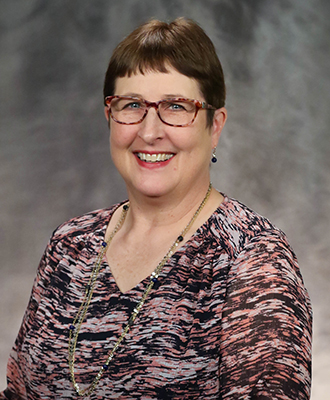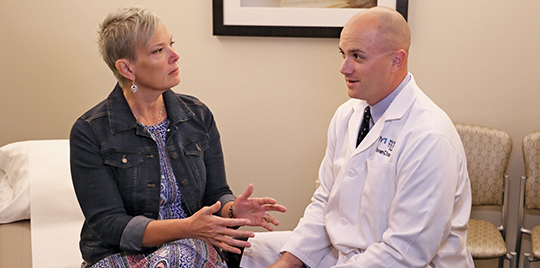Younger Minds Impacted by Alzheimer's
November 3, 2021By: Kim Shopper
Categories: Live Healthy, Neurosciences, Patient Stories, Your Wellness
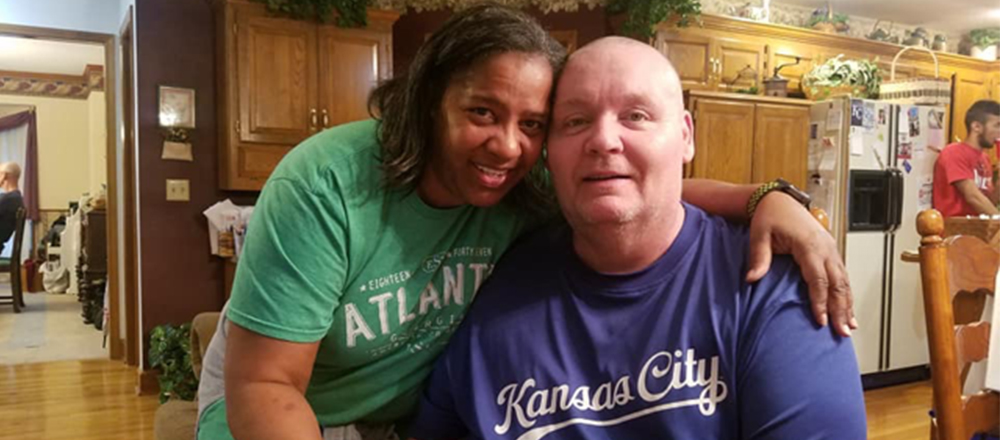
ED Coordinator Sherry Recob, CNA, CMT, dreamed of growing old with her husband of 28 years, Darrell Jr. Sherry met Darrell when she was age 21 and connected with his gregarious personality and life-of-the-party persona. She relied heavily on those early memories as she and Darrell walked the path of Alzheimer’s disease, which led to his death two years ago at age 53.
Family Connection
Darrell died in November, which is also Alzheimer’s Awareness Month. A neurologist diagnosed him with familial hereditary Alzheimer’s disease. His father died of the same condition at age 55, which meant Darrell and his siblings had a 50/50 chance of carrying the gene. “After his dad’s diagnosis, Darrell told me he wasn’t going to live to grow old with me,” Sherry remembered. “It’s like he knew.”
Life to the Fullest
Sherry described Darrell as someone who lived each day to the fullest. The avid Chiefs fan, golfer and tennis player loved Las Vegas. “He could brighten a room when he walked in, and even before the diagnosis, he lived each day as if it was his last,” Sherry said.
Sherry became concerned when Darrell struggled with simple tasks, like lying down in bed, getting in a car or remembering what he ate. Medication helped improve his memory to a point, but the disease progressed. He opted for quality of life instead of experimental treatments.
As the couple resigned themselves to Darrell’s fate, they took trips to Las Vegas, Walt Disney World and local destinations. Sherry captured those moments in photos and videos.
Stress of Caregiving
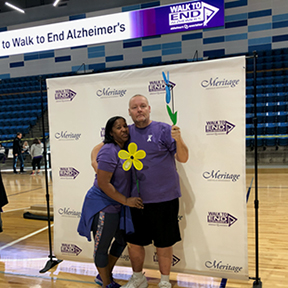 It wasn’t long before sleepless nights and youthful memories replaced those fun trips. Sherry became Darrell’s caregiver for the next five years. She juggled work with caring for her husband’s needs. His mind often reverted to his teenage years. Sherry equates those days to caring for a child in an adult’s body.
It wasn’t long before sleepless nights and youthful memories replaced those fun trips. Sherry became Darrell’s caregiver for the next five years. She juggled work with caring for her husband’s needs. His mind often reverted to his teenage years. Sherry equates those days to caring for a child in an adult’s body.
She reached out to organizations for financial help and resources but discovered Alzheimer’s services are geared for older patients. Early-onset Alzheimer’s affects people younger than 65, which impacts up to 240,000 adults in the United States. More people are being diagnosed at a younger age. “I was told to come back when he turned 55, and I said he won’t live that long,” Sherry recalled. The Alzheimer’s Association provided funds for cameras so she could monitor Darrell while she worked.
Sherry vowed to keep Darrell at home, and it’s a promise she kept. She slept when he slept and kept her hand on his hand. If he moved, she woke up. She functioned on little sleep. “It was rough, but I wouldn’t change it for the world,” Sherry said. Nursing friends sat with Darrell to give Sherry a break.
Personality Changes
Even with Sherry as the constant presence in his life, sometimes he didn’t recognize her. “I would sit beside him, and he would look at me and ask when Sherry was coming home. Later, he would look at me again and wonder when I got home,” she said.
As Darrell’s disease progressed, it turned the 6-foot 4-inch gentle soul into a stranger. Sometimes, she feared for her safety. “When he got angry, I would sit in my closet,” she said. “If I was out-of-sight, he forgot about me and calmed down.”
Memories Forever
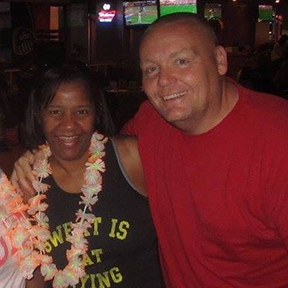 Toward the last months of Darrell’s life, Sherry recorded conversations with him as they laid in bed. Hearing his voice today brings her comfort. “One time he said, ‘You need to let me go, so you can get back to your family. You will always be my girl,’” said Sherry, emotionally. “He knew I wasn’t going to give up, and I would keep fighting for him.”
Toward the last months of Darrell’s life, Sherry recorded conversations with him as they laid in bed. Hearing his voice today brings her comfort. “One time he said, ‘You need to let me go, so you can get back to your family. You will always be my girl,’” said Sherry, emotionally. “He knew I wasn’t going to give up, and I would keep fighting for him.”
Another time Darrell talked about taking a train. He asked her to come with him. She told him she couldn’t go. He passed away a few months later.
Losing the love of her life caused Sherry to reevaluate her own life. She recently became certified to give medications to patients and plans to work oncall at a memory care unit helping patients with Alzheimer’s and their families. She also has a different perspective on life today. “Slow down, smell the roses and enjoy life. If you see someone having a bad day, you never know what has happened. A simple gesture, like a cup of coffee or a friendly greeting, can turn their day around,” Sherry smiled.
How To Cope
Caregiver tips:
- Ask friends and family members for help.
- Attend a caregiver’s support group.
- Help the person establish a daily routine.
- Install cameras to monitor the person if you need to leave.
- Label cabinets with pictures, like a plate and silverware, to help your loved one remember where to find those items.
- Reach out to organizations, including the Alzheimer’s Association.
- Remember to care for the caregiver
Explore More
Our speech-language pathology department includes services for patients with cognitive-linguistic challenges that affect attention/concentration, memory, problem-solving skills, thought organization and reasoning.
